陈珍珍Unit1+Where+did+you+go+on+vacation+_SectionB(2a-2e)课件
人教新目标版英语八上Unit 1《Where did you go on vacation》(Sec
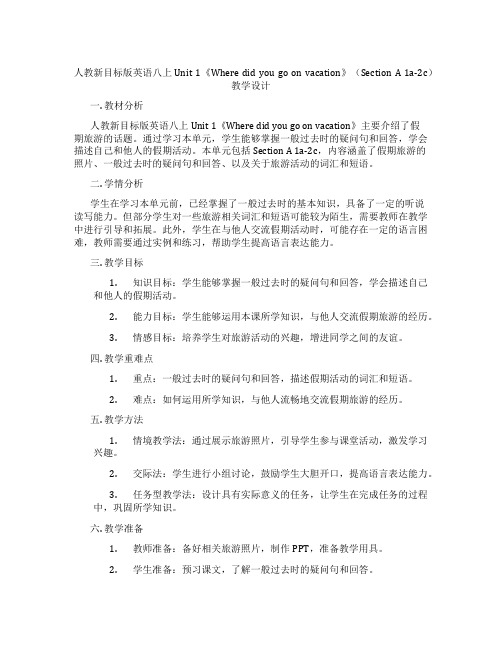
人教新目标版英语八上Unit 1《Where did you go on vacation》(Section A 1a-2c)教学设计一. 教材分析人教新目标版英语八上Unit 1《Where did you go on vacation》主要介绍了假期旅游的话题。
通过学习本单元,学生能够掌握一般过去时的疑问句和回答,学会描述自己和他人的假期活动。
本单元包括Section A 1a-2c,内容涵盖了假期旅游的照片、一般过去时的疑问句和回答、以及关于旅游活动的词汇和短语。
二. 学情分析学生在学习本单元前,已经掌握了一般过去时的基本知识,具备了一定的听说读写能力。
但部分学生对一些旅游相关词汇和短语可能较为陌生,需要教师在教学中进行引导和拓展。
此外,学生在与他人交流假期活动时,可能存在一定的语言困难,教师需要通过实例和练习,帮助学生提高语言表达能力。
三. 教学目标1.知识目标:学生能够掌握一般过去时的疑问句和回答,学会描述自己和他人的假期活动。
2.能力目标:学生能够运用本课所学知识,与他人交流假期旅游的经历。
3.情感目标:培养学生对旅游活动的兴趣,增进同学之间的友谊。
四. 教学重难点1.重点:一般过去时的疑问句和回答,描述假期活动的词汇和短语。
2.难点:如何运用所学知识,与他人流畅地交流假期旅游的经历。
五. 教学方法1.情境教学法:通过展示旅游照片,引导学生参与课堂活动,激发学习兴趣。
2.交际法:学生进行小组讨论,鼓励学生大胆开口,提高语言表达能力。
3.任务型教学法:设计具有实际意义的任务,让学生在完成任务的过程中,巩固所学知识。
六. 教学准备1.教师准备:备好相关旅游照片,制作PPT,准备教学用具。
2.学生准备:预习课文,了解一般过去时的疑问句和回答。
七. 教学过程1.导入(5分钟)教师展示旅游照片,引导学生谈论假期旅游的经历,激发学生对本课内容的兴趣。
2.呈现(10分钟)教师通过PPT展示课文1a-1c的内容,引导学生跟读,注意语音语调。
Unit_1_Where_did_you_go_on_vacation 全文

Unit 1 Where did you go on vacation?SECTION ALanguage Goal:Talk about past events.Where did you go on vacation?I went to the mountains.1a Match the activities with the pictures [ a-g].1. stayed at home f 5. went to the mountains c2. went to New York City b 6. went to the beach a3. visited my uncle g 7. visited museums e4. went to summer camp d★1b Listen and number the people in the picture [ 1-5 ]. Conversation 1Xiang Hua: Hey, Tina. Where did you go on vacation?Ti na: I went to the mountains with my family.Xiang Hua: Did everyone have a good time?Tina: Oh,yes.Everything was excellent.Where did you go, Xiang hua? Xiang Hua: I went to New York City.Conversation 2Girl: What did you do on vacation,Sally?Sally: Nithing.I just stayed at home.Girl: And did you do anything interesting,Bob?Bob : Yes,I visited my uncle.We went fishing,but we didn’t get any fish. Conversation 3Boy: Did you go anywhere on vacation,Tom?Tom: I went to summer camp.Boy: Did you go with anyone?Tom: Yes,I went with my friends.Everyone had a great time.★2a Listen.Where did the people go on vacation? Complete the chart. Conversation 1Boy: Where did you go on vacation, Grace?Grace: I went to New York City.Boy: Oh, really? Did you go with anyone?Grace: Yes, I went with my mother.Boy: Did you go to Central Park?Grace: Yes,I did.It was really nice.Boy: Did you buy anything special?Grace: Yes.I bought something for my father.Boy: Oh,Really?What?Grace: I bought him a hat.Conversation 2Girl: Where did you go on vacation, Kevin? Kevin: I went to the beach.Girl: Oh, that’s nice. Did you play volleyball? Kevin: No, I didn’t.Girl: Well, did you swim?Kevin: Yes, I did. The water was really warm.Girl: How was the food?Kevin: Everything tasted really good!Girl: Did you meet anyone interesting?Kevin: Yes.I met some very interesting people. Conversation 3Boy: Where did you go on your vacation, Julie? Julie: I stayed at home.Boy: Oh. So, did you do anything interesting? Julie: No, I didn’t.Boy: Did you study for tests?Julie: Yes, I did.Boy; Did you go out with anyone?Julie: No.No one was here.Everyone was on vacation.2c Role-play the conversation.A: Grace,where did you go on vacation?B: I went to New York City.A: Oh,really? Did you go with anyone?B: Yes, I went my mother.2d Role-play the conversation. RickRick: Hi, Helen. Long time no see.Helen: Hi, Rick. Yes, I was on vacation last month.Rick: Oh, did you go anywhere interesting?Helen: Yes, I went to Guizhou with my family.Rick: Wow! Did you see Huangguoshu Waterfall?Helen: Yes, I did. It was wonderful! We took quite a few photos there. What about you? Did you do anything special last month?Rick: Not really. I just stayed at home most of the time to read and relax.3a Fill in the blanks with the words in the box and practice theLinda: Did you do anything fun on your vacation, Alice?Alice: yes, I did. I went to Sanya.Linda: How did you like it?Alice: Well, it was my first time there. So everything was really interesting. Linda: Did you go with anyone ?Alice: Yes, I did. I went with my sister.Linda: Did you go shopping?Alice: Of course. I bought something for my parents, but nothing for myself.Linda: Why didn’t you buy anything for yourself?Alice: I didn’t really see anything I liked.Section B1a Match the words with the pictures below.1. Delicious f 3. exciting c 5. terrible b2. expensive a 4. cheap e 6. boring d1b.look at the words in 1a again. Write ☺words on the left. Write ☻words on the right.☺words ☻ wordsdelicious terriblecheap expensiveexciting boring1c Listen. Lisa is talking about her vacation. Answer the questions.1.Where did Lisa go on vacation? She went to Hong Kong.2. Did she do anything special there? What was it?Yes, she went to a fun park.3. Did she buy anything for her best friend? Yes, she did.4. Did Lisa like her vacation? Yes, she did.1d Listen again and fill in the blanks.What did Lisa say about..?her vacation great the people (really) friendlythe fun park(really)exciting the food delicious the stores (very)expensive1e Ask and answer questions about Lisa’s vacation. Begin your2b Read Jane’s diary entries about her vacation and answer the questions. Did Jane have a good time on Monday? What about on Tuesday?Monday, July 15thI arrived in Penang in Malaysia this morning with my family. It was sunny and hot, so we decided to go to the beach near our hotel. My sister and I tried paragliding. I felt like I was a bird. It was so exciting. For lunch, we had something very special--Malaysian yellow noodles. They were delicious! In the afternoon, we rode bicycles to Georgetown. There are a lot of new buildings now, but many of the old buildings are still there. In Weld Quay, a really old place inGeorgetown, we saw the houses of the Chinese traders from 100 years ago. I wonder what life was like here in the past. I really enjoyed walking around the town.Tuesday, July 16thWhat a difference a day makes! My father and I decided to go to Penang Hill today. We wanted to walk up to the top, but then it started raining a little so we decided to take the train. We waited over an hour for the train because there were too many people. When we got to the top, it was raining really hard. We didn’t have an umbrella so we were wet and cold. It was terrible! And because of the bad weather, we couldn’t see anything below. My father didn’t bring enough money, so we only had one bowl of rice and some fish. The food tasted great because I was so hungry!2d Complete the conversation using information in the diary entries. Anna: Hi, Jane. Where did you go on vacation last week?Jane: I went to Penang in Malaysia .Anna: who did you go with?Jane: I went with my family .Anna: what did you do?Jane: The weather was hot and sunny on Monday, so we went paragliding on the beach. Then in the afternoon, we rode bicycles to Georgetown.Anna: Sounds great!Jane: Well, but the next day was not as good. My father and I went to Penang Hill,but the weather was really bad and rainy. We waited a long time for the train and we were wet and cold because we forgot to bring an umbrella .Anna: Oh, no!Jane: And that’s not all! We also didn’t bring enough money, so we only had one bowl of rice and some fish.2e Imagine Jane went to Penang Hill again and had a great day. Fill in the blanks in her diary entry with the correct forms of the verbs in brackets.Thursday, July 18thToday was (be) a beautiful day. My father and I went (go) to Penang Hill again, but this time we walked (walk) to the top. We started (start) at 9:30 a.m. and saw (see) lots of special Malaysian flowers along the way. About one hour later, we stopped (stop) and drank (drink) some tea. Then we walked (walk) for another two hours before we got (get) to the top. I was (be) quite tired, but the city looked (look) wonderful from the top of the hill!3a Complete the diary entry about a trip to one of these places. Use theAugustToday the weather was hot and sunny . I went to Tianánmen Square/the Place Museum/a Beijing hutong. It was interesting/ beautiful .We took some photos/bought something special. I liked this place because I learned something important. For dinner we had Beijing duck. It was delicious . In the evening, I felt really tired .3b Answer the questions to make notes about a vacation you took.1.Where did you go?2. Did you go with anyone?3. How was the weather?4. What did you do every day?5. What food did you eat?6. What did you like best?7. Did you dislike anything?8. How did you feel about the trip?3c Write a travel diary like Jane’s on page 5. Use your notes in 3b.Thursday, August 1stToday I went to the Palace Museum. It was cool. Then I went to visit the Great Wall. How great it is! I took many photos there. In the afternoon, I went to Tian’an Men Square. The square is very large. Today is Chinese Army Day. So there were many people there and it was very crowded. We had great fun playing there! At last, we traveled around BeijingHutong on three-wheelers. The Chinese people are very friendly. I felt very happy today, but I was really tired.4.Imagine you are all of foreigners on vacation in China. You meet each other at the airport on your way home. Talk about what you did on your vacation.Hi, my name’s Paul. Hi, Paul. I’m Anna. Where did you go on vacation?I went to Nanjing. Oh, I went to Beijing. Did you do anything special in Nanjing? Self Check1. A: Did anyone go on vacation with you last month?B: Yes, my family went to the countryside with me.2. A: Did your family go to the beach with you last weekend?B: No. No one from my family went, but my friend went with me.3. A: I didn’t bring back anything from Malaysia.B: Nothing at all? Why not?4. A: Did you buy anything in the shopping center?B: No, I didn’t. Everything was very expensive.5. A: How was the volleyball game yesterday?B: Great! Everyone had a fun time!plete the passage with the correct forms of the verbs in brackets. Last August, our class did (do) something very special on our school trip. We went (go) to Mount Tai. We started (start) our trip at 12:00 at night. Everyone in our class took (take) a bag with some food and water. After three hours, someone looked at the map and found (find) out we were not (be, not) anywhere near the top. My legs were (be) so tired that I wanted to stop. My classmates told (tell) me to keep going, so I went (go) on. At 5:00 a.m., we got to the top! Everyone jumped (jump) up and down in excitement. Twenty minutes later, the sun started (start) to come up. It was so beautiful that we forgot (forget) about the last five hours!。
人教版八年级上册unit 1 where did you go on vacations知识点归纳打印版

八年级上册 unit 1 where did you go?1.去度假 2呆在家里 3去爬山 4去沙滩5.拜访我的叔叔________6.参观博物馆__________7.去夏令营____________8.去中心公园____________ 9.为了考试而学习___________ 10.和某人出去________ 11.好久不见________________ 12.上个月__________ 13.一些有趣的地方_________ 14.照相__________ 15.大多数时间___________ 16.相当多__________ 17.……怎么样?___________ 18.去购物_________ 19.为我的父亲买一些东西______________ 20.第一次________ 21.当然__________/_________22.喂鸡_________________23.无事可做_____________ 24.记日记___________ 25.感觉像_____________26.北京烤鸭_____________ 27.天安门广场______________ 28.故宫____________ 29.带回来___________ 30.在购物中心_______________31.学校旅行____________ 32.骑自行车去……______________ 33.许多,大量___________ 34.许多古老的建筑____________-35.中国商人的房子__________________36.一百年前____________ 37.在过去____________38.多么与众不同的一天________________________39.走上顶端________________40.太多_________41.由于坏的天气_____________ 42.第二天___________43.沿途_____________44.找出___________45.继续________ 46.兴奋的_____________47.上升,出来__________48.山顶_______________49.这不是全部_______________50.一碗米饭__________________51.再见,就此止笔________________52.四处走走_____________________,53.few,a few, little, a little用法54.no one, none, nobody区别55.不定代词用法56.most of ……大多数的……用法,57.quite a few ,quite a little ,quite a lot 用法,58,大多数时间做某事59.你认为它怎么样?询问别人对某人或某物的看法60,seem的用法,61.buy的用法,62,decide用法,63,try用法,64.so和such区别65.because ,because of 区别66,enough用法67begin,start用法68.想要(3种)69.继续做某事70,重点句子(1)你去哪度假了?(2)你去有趣的地方了吗?(3)上个月你做了一些特殊的事情吗?(4)大多数时间你只是呆在家里去读书和放松(5)你家里的某个人跟你一起去了吗?(6)我们喂鸡并看了一些小猪(7)唯一的问题是晚上除了看书外无事可做(8)天气晴朗,炎热,所以我们决定去旅店旁边的沙滩(9)我感觉我像一只小鸟(10)我想知道在过去这里生活是什么样的(11)我想走到山顶,但紧挨着天开始下雨,我们决定乘火车(12)由于糟糕的天气,我们不能看到下面的任何东西!。
Unit1Wheredidyougoonvacation(4课时教案)

1.理论介绍:首先,我们要了解一般过去时和旅行词汇的基本概念。一般过去时是用来描述过去发生的事情的时态,而旅行词汇则是我们在描述旅行经历时会用到的关键词汇。
2.案例分析:接下来,我们来看一个具体的案例。这个案例展示了如何用一般过去时和旅行词汇来描述一段假期旅行。
3.重点难点解析:在讲授过程中,我会特别强调一般过去时的动词变化和旅行词汇的运用这两个重点。对于难点部分,我会通过举例和比较来帮助大家理解。
然而,我也注意到在讲解一般过去时和旅行词汇的过程中,部分学生对动词过去式的变化规则掌握不够熟练,这在课堂练习中表现得尤为明显。为此,我计划在下一节课开始前,用更多实例和互动游戏帮助学生巩固这部分知识。
此外,在实践活动和小组讨论中,学生们表现出了很高的积极性。他们能够运用所学知识进行实际情境的对话练习,展示了对一般过去时的运用和理解。但在引导讨论过程中,我意识到需要进一步关注学生的个体差异,对基础较弱的学生给予更多关注和指导,以提高他们的自信心和参与度。
Unit 1 Where did you go on vacation(4课时教案)
一、教学内容
《Unit 1 Where did you go on vacation》共分为四个课时,教学内容主要包括:
1.第一课时:引入本单元主题,学习询问和回答假期旅行的地点。重点词汇包括:beach, mountain, camp, city, visit等。学习一般过去时的用法,如:“I went to the beach.”
(三)实践活动(用时10分钟)
1.分组讨论:学生们将分成若干小组,每组讨论一个与假期旅行相关的实际问题。
2.实验操作:为了加深理解,我们将进行一个简单的角色扮演活动。这个活动将演示如何在实际对话中使用一般过去时和ห้องสมุดไป่ตู้行词汇。
Unit1--Where-did-you-go-on-vacation
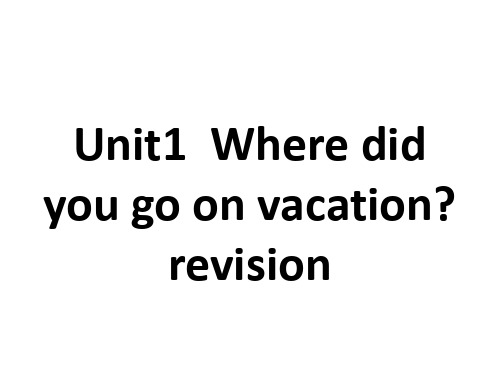
The songs sound beautiful.这些歌曲听起来 很优美。
过得高兴,玩得愉快
have a good\great\fun time (=enjoy oneself)
They had a good time yesterday.= They enjoyed themselves yesterday.
find—found找到
2.不定代词和不定副词的用法
some
body
any
one
every thing
no
where(疑问副
词)不定代词和不定副词
(1)左边的some、any、every、no与右 边的body、one、thing构成不定代词, some、any、every、no与右边的疑问副 词where构成不定副词;
2. 回顾一下在3b中所回答的问题的情况,然后 将这些句子按恰当的逻辑顺序排列在一起, 形成条理清晰的一段文字。
3. 可根据旅行经历再加一些恰当想像的句子。 4. 再次,阅读一遍短文,看有没有错误的句
子。
假如你和你的家人在四月八号这天参观了北 京,请你以日记的形式把这天的经历及感受 记录下来。 提示:1. 早上:参观颐和园(爬万寿山;在 昆明湖划船) 2. 中午:吃北京烤鸭 3. 下午: 逛王府井大街 参考词汇:颐和园 the Summer Palace; 万寿山 Longevity Hill;昆明湖Kunming Lake;王府井大街 Wangfujing Street;风 景 scenery
1. 定基调 体裁:应用文(日记);日记的主体部分为 记叙文 时态:谈过去的经历时,用一般过去时。 人称:写个人经历时,用第一人称。
Unit1WheredidyougoonvacationSectionB3a-SelfChck教案

2.语法:复习一般过去时态的用法,特别是动词过去式的变化规则。
3.句型:学习并运用以下句型描述过去的假期经历:
- Where did you go on vacation?
- What did you do there?
-语法:一般过去时态是本节课的重点语法内容,教师应着重讲解动词过去式的变化规则,以及如何使用一般过去时态描述过去的事件。
-句型:重点句型包括“Where did you go on vacation?”、“What did you do there?”、“How was your vacation?”等,教师需引导学生通过替换关键词进行句型练习,加强口语表达能力。
Unit 1 Where did you go on vacation Section B 3a-Self Chck教案
一、教学内容
本节课选自七年级英语教材《Unit 1 Where did you go on vacation》的Section B 3a-Self Check部分。教学内容主要包括以下几方面:
其次,在进行实践活动时,我发现学生们在用英语描述假期经历时,词汇运用较为单一,句型结构也显得有些简单。为了提高学生的表达能力,我打算在下一节课中增加一些词汇和句型的讲解,鼓励学生在写作和口语表达中尝试使用更多丰富多样的词汇和句型。
此外,小组讨论环节,学生的参与度较高,但部分学生在讨论中显得有些紧张,不敢大胆地表达自己的观点。我觉得在今后的教学中,应该更加关注这部分学生的心理状态,多给予鼓励和支持,帮助他们建立自信,更好地参与到课堂讨论中来。
五、教学反思
今天的课堂,我们围绕《Unit 1 Where did you go on vacation》的Section B 3a-Self Check部分进行了深入学习。在教学中,我发现了一些值得注意的地方。
陈珍珍Unit1WheredidyougoonvacationSectionB2a2e

raining a little sSohweeddiedcind’etdhtoavtaekeathgeotoradint.iWmee.waited over an hour
for the train because there were too many people. When we got to the top, it was raining really hard. We didn’t have an umbrella so we were wet and cold. It was terrible ! And because of the bad weather, we couldn’t see anything below. My father didn’t bring enough money, so we only had one bowl of rice and some fish. The food tasted great because I was so hungry!
Roti Canai and Teh Tarik 煎饼和拉茶
Asam Laksa 阿参拉沙
Local delicacies
Bah Kut Teh / Chic Kut Teh 肉骨茶
Nasi Dagang 手扒饭
Unit-1-Where-did-you-go-on-vacation教案

Unit-1-Where-did-you-go-on-vacation教案Unit 1 Where d id you go on vacation?Period1 Section A 1 (1a-2a)一、Teaching aims1. Knowledge objectives1) Students can master the following words anyone, anywhere, wonderful, quite a few, most2) Students can master the target language①—Where did you go on vacation? —I went to the mountains.②—Where did Tina to on vacation? —She went to the beach.③—Did you go with anyone? —Yes, I did./No, I didn’t.3)The special interrogative sentence ,general question and the short answers in the simple past tense.2.Emotional objectivesStudents can use the simple past tense to communicate with others.Foster the awareness of environmentalprotection, encouge the Ss to love the nature.二、Key and difficult points1) Students can talk about their vacations by using the knowledge they’ve learned before. 2) Students can master the new words in this class.三、Teaching proceduresStep I. Lead-in1.Teacher talked about her summer vacation and write some expressions on the board at the same time.Then ask the students something about their vacations.—Where did you go on vacation? —I went to summer camp.—Did you go with anyone? —Yes, I did./No, I didn’t.(I went there with my sister.)2.Write many expressions about vacation activities on the board. (Use colorful chalk to emphasize the past tense of the verbs)Step II. Presentation1.Let Ss read the expressions on the board.3. Let some pairs act out their conversations. Step V.Homework1.Interview a classmate and write a conversation.2. Turn the conversations in 1b into a short passage. Like this, Tina went to the mountains with her family. Everything was excellent. They had a good time. Xiang hua went …(Ss can finish it with the help of the tapescripts on page 95)3.Workbook, 词汇训练II,语法训练I(P1)反思:Period2 Section A (2b-3b)一、Teaching aims1. Review and practice the key points and structures in the last class.2.Learn and summarize the usage of indefinite pronouns(anyone, someone, everyone, something, anythin g, nothing )3. Students can master the following wordssomething, nothing, someone,everyone, of course, myself, yourself ,hen,pig,see m,bored, diary.4. Students can master the target language①—Did you buy anything special? —Yes, I bought something for my father.②—Did you go anywhere interesting? —Yes,I went to GuiHou with my family.③—How did you like it? —Well, it was my first time there,so everything was really interesting.二、Teaching key and difficult points1. Teaching key points1)Students can talk about vacations by using the functions and strctures they’ve learned.2) Students can use the new words in this class correctly.2. Teaching difficult points1) The usage of indefinite pronouns(anyone, someone, everyone, something, anything, nothing )2) How to improve the SS’ ability in filling in the blanks.三、Teaching proceduresStep I. RevisionCheck their homework on workbook. Review the structures in the last class.Where did you/Grace go on vacation? Did you/she go with anyone?Step II. Presentation1.2ba.Let Ss read the phrases in the chart of 2b.T: You will hear a conversation about three students’ conversations.Listen again andcheck Yes, or No.b.Play the recording a second time for the Ss to ch eck “Yes, I did.”or“No, I didn’t.”c. Check the answers with the Ss.2.2ca. Let two Ss read the conversation among Grace, Kevin and Julie.b. Let Ss work in pairs and try to role-play the c onversation.c. Ask some pairs to act out their conversations. Step III. Practice2d. Role-playa.First let Ss read the conversation thenlet Ss act out the conversations in pairs.b. Some explanations in 2d.be on vacation 在度假quite a few 相当多 a few和few地区别和用法anything special(不定代词与形容词连用,形容词后置)Step IV Learn Grammar (Indefinite pronouns) and do exercises1.Ask The Ss to learn Grammar (Indefinite pronouns) by themselves and then finish 3a,3b.2.Ask them to discuss their answers with their group members.3.Check the answers.4. Read the sentences in Grammar focus.Step V Try to Find and summarize一、不定代词总结:1. some, any, no, every与-one, -thing可以组成八个不定代词,他们分别是:someone, ________ _______ ________ ________ __ __________ ______________。
英语 unit1 where did you go on vacation

课文标题:Jane’s diary entries单元名称:Unit 1 where did you on vacation 教材版本:Go for it!授课年级:Grade 8教材分析本节课是一堂阅读课,选自人教版八年级上册第一单元,单元话题是假期旅行,单元任务是学会使用一般过去时谈论假期活动等过去的事情。
学情分析本话题的内容在七年级下册第2单元和第11单元出现过,本单元在上两个单元内容的基础上增加了谈论对度假的看法和感受的表达,重点语法一般过去时,学生也在七年级有所接触,本单元着力将学生的注意力引向一般过去时的疑问结构,让学生注意观察谓语动词在问句中的特征。
教学目标By the end of the lesson, students will be able to:●Grasp some information of the passage and retell the story of Jane’s trip●Use the target language to talk about their own travel experience.●Master the basic structure of a travel entry教学重难点Teaching focus1.重点词汇和短语decide, building, trader, umbrella, difference,hungry,feel like等2.重点句型:Where did you go on vacation? What did you do on vacation?3.重点语法:一般过去时Teaching difficulty●Master the basic format and elements of writing a travel diary, and be able to write a travel diary on your own, including the activities, feelings and reasons for the trip.教学方法任务型教学法,交际教学法,PWP阅读教学法教学工具多媒体,PPT,videosTeaching proceduresStep1 warming up头脑风暴思考自己喜欢或知道的假期活动回答问题,在图片的帮助下学习新词。
unit-1-Where-did-you-go-on-vacation知识总结
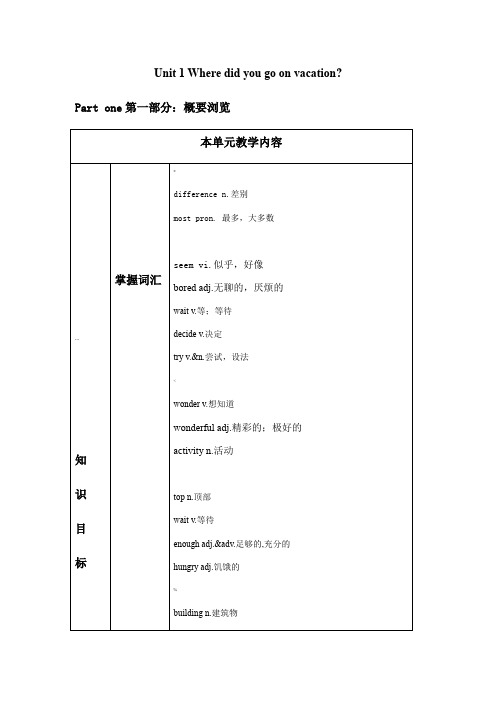
Unit 1 Where did you go on vacation? Part one第一部分:概要浏览)Part two 第二部分;知识点详解单词与短语讲解(一)quite a few的用法a few 意为“一些,若干(=some)”,后跟可数名词复数形式。
quite a few 意为“相当多;不少(=many)”后跟可数名词复数形式。
We took ____ ____ _____ _____ in the park last weekend.上周末,我们在公园里拍了相当多的照片。
【拓展】:few/a few/quite a few/little/a little/quite a little的用法1.most + 名词泛指多数,无范围most students大部分学生2.most + of + the (this/that/those/these等)+名词,指某一范围内的多数。
______ _____ _______students go to school by bike.这些学生们中的多数骑自行车去上学。
;(三)seem的用法seem“好像”,既可以后跟___________,又可以后跟___________。
【活学活用】1.The pig seems ___________(healthy/ healthily).2.Tom seemed ___________(know/ to know) the test result.3.I seem__________(have)a cold【拓展】(1.It seems+that从句看起来好像…;似乎….It seems that he is happy.=He seems _____ _____ happy. 他似乎很快乐。
2.seem like….好像,似乎…..It seems like a good idea.它似乎好像一个好主意。
人教新目标版英语八上Unit1《Wheredidyougoonvacation》精美说课稿
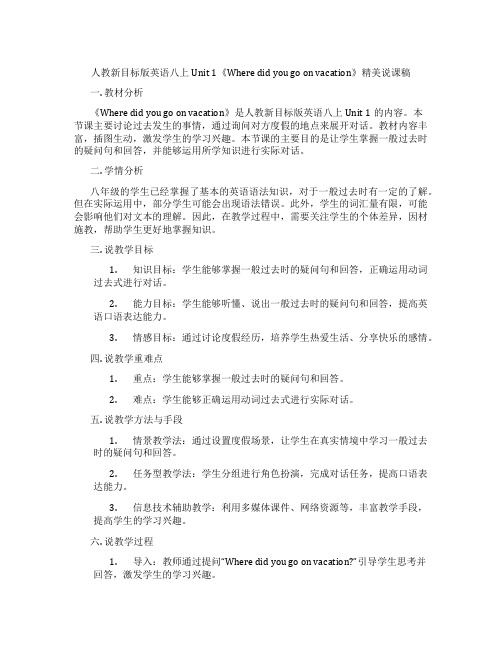
人教新目标版英语八上Unit 1《Where did you go on vacation》精美说课稿一. 教材分析《Where did you go on vacation》是人教新目标版英语八上Unit 1的内容。
本节课主要讨论过去发生的事情,通过询问对方度假的地点来展开对话。
教材内容丰富,插图生动,激发学生的学习兴趣。
本节课的主要目的是让学生掌握一般过去时的疑问句和回答,并能够运用所学知识进行实际对话。
二. 学情分析八年级的学生已经掌握了基本的英语语法知识,对于一般过去时有一定的了解。
但在实际运用中,部分学生可能会出现语法错误。
此外,学生的词汇量有限,可能会影响他们对文本的理解。
因此,在教学过程中,需要关注学生的个体差异,因材施教,帮助学生更好地掌握知识。
三. 说教学目标1.知识目标:学生能够掌握一般过去时的疑问句和回答,正确运用动词过去式进行对话。
2.能力目标:学生能够听懂、说出一般过去时的疑问句和回答,提高英语口语表达能力。
3.情感目标:通过讨论度假经历,培养学生热爱生活、分享快乐的感情。
四. 说教学重难点1.重点:学生能够掌握一般过去时的疑问句和回答。
2.难点:学生能够正确运用动词过去式进行实际对话。
五. 说教学方法与手段1.情景教学法:通过设置度假场景,让学生在真实情境中学习一般过去时的疑问句和回答。
2.任务型教学法:学生分组进行角色扮演,完成对话任务,提高口语表达能力。
3.信息技术辅助教学:利用多媒体课件、网络资源等,丰富教学手段,提高学生的学习兴趣。
六. 说教学过程1.导入:教师通过提问“Where did you go on vacation?”引导学生思考并回答,激发学生的学习兴趣。
2.新课呈现:教师展示教材插图,介绍一般过去时的疑问句和回答。
3.课堂活动:学生分组进行角色扮演,完成对话任务,教师巡回指导。
4.巩固练习:学生进行小组竞赛,看哪个小组能够在最短时间内完成一般过去时的疑问句和回答。
Unit-1--Where-did-you-go-on-vacation-知识点汇总
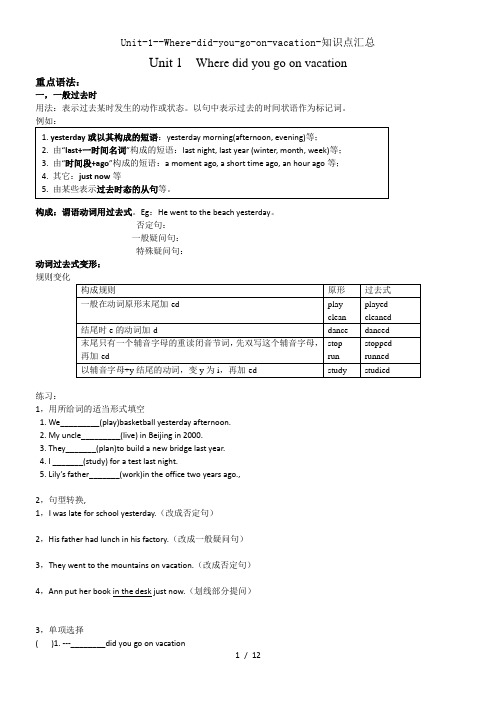
Unit 1 Where did you go on vacation 重点语法:一,一般过去时用法:表示过去某时发生的动作或状态。
以句中表示过去的时间状语作为标记词。
例如:构成:谓语动词用过去式。
Eg:He went to the beach yesterday。
否定句:一般疑问句:特殊疑问句:动词过去式变形:规则变化练习:1,用所给词的适当形式填空1. We_________(play)basketball yesterday afternoon.2. My uncle_________(live) in Beijing in 2000.3. They_______(plan)to build a new bridge last year.4. I _______(study) for a test last night.5. Lily’s father_______(work)in the office two years ago.,2,句型转换,1,I was late for school yesterday.(改成否定句)2,His father had lunch in his factory.(改成一般疑问句)3,They went to the mountains on vacation.(改成否定句)4,Ann put her book in the desk just now.(划线部分提问)3,单项选择( )1. ---________did you go on vacation---Hong Kong.A. WhatB. HowC. WhereD. When( )2. I_____my homework last night. I went to the cinema with my parents.A. didB. didn’tC. didn’t doD. don’t do( )3. ---Did they clean the house yesterday afternoon---_________. They cleaned it this morning.A. No, they don’tB. Yes, they didC. No, they didn’t C. Yes, they do( )4. ---_____Tom and Jim_____a walk yesterday evening---No, they____.A. Do; take; doesn’tB. Did; take; didn’tC. Did; take; didD. Do; take; don’t ( )5. ---The coat looks good on you. Where______you______it---In a supermarket.A. do; buyB. did; buyC. will; buyD. does; buy二、复合不定代词Did you go with anyone Did you find anything special用法:1,作主语时,谓语动词用单数Everone (be)here.2, 被形容词修饰时,形容词必需后置。
八年级英语Unit1-where-did-you-go-on-vacation-教案

八年级上Unit 1 Where did you go on vacation? 一.Phrases1。
go on vacation去度假2. stay at home待在家里3。
go to the mountains去爬山4. go to the beach去海滩5。
visit museums 参观博物馆6. go to summer camp去参观夏令营7。
quite a few相当多8. study for为……而学习9. go out出去10。
most of the time大部分时间11。
taste good尝起来很好吃12。
have a good time玩得高兴13。
of course当然14。
feel like给……的感觉;感受到15。
go shopping去购物16. in the past在过去17。
walk around四处走走18. because of因为19。
one bowl of… 一碗……20。
the next day第二天21. drink tea喝茶22. find out找出;查明23。
go on继续24. something important重要的事25. up and down上上下下26. come up出来27. take photos照相二.句型集萃1。
buy sth. for sb. / buy sb。
sth. 为某人买某物2. taste + adj. 尝起来……3。
seem+(to be)+ adj。
看起来……4。
keep doing sth。
继续做某事5。
arrive in+大地点/ arrive at+小地点到达某地6。
tell sb. (not) to do sth。
告诉某人(不要)做某事7。
try doing sth. 尝试做某事/ try to do sth. 尽力去做某事8。
decide to do sth。
决定去做某事9. forget doing sth. 忘记做过某事/10. forget to do sth. 忘记做某事11. enjoy doing sth。
Unit 1 Where did you go on vacation 重点速记+语法精讲+写作指导
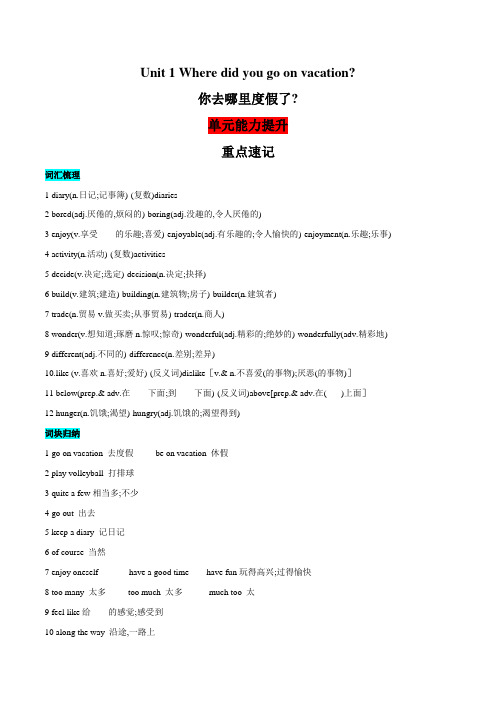
Unit 1 Where did you go on vacation?你去哪里度假了?单元能力提升重点速记词汇梳理1 diary(n.日记;记事簿)-(复数)diaries2 bored(adj.厌倦的,烦闷的)-boring(adj.没趣的,令人厌倦的)3 enjoy(v.享受······的乐趣;喜爱)-enjoyable(adj.有乐趣的;令人愉快的)-enjoyment(n.乐趣;乐事)4 activity(n.活动)-(复数)activities5 decide(v.决定;选定)-decision(n.决定;抉择)6 build(v.建筑;建造)-building(n.建筑物;房子)-builder(n.建筑者)7 trade(n.贸易v.做买卖;从事贸易)-trader(n.商人)8 wonder(v.想知道;琢磨n.惊叹;惊奇)-wonderful(adj.精彩的;绝妙的)-wonderfully(adv.精彩地)9 different(adj.不同的)-difference(n.差别;差异)10.like (v.喜欢n.喜好;爱好)-(反义词)dislike[v.& n.不喜爱(的事物);厌恶(的事物)]11 below(prep.& adv.在······下面;到······下面)-(反义词)above[prep.& adv.在(·····)上面]12 hunger(n.饥饿;渴望)-hungry(adj.饥饿的;渴望得到)词块归纳1 go on vacation 去度假be on vacation 休假2 play volleyball 打排球3 quite a few相当多;不少4 go out 出去5 keep a diary 记日记6 of course 当然7 enjoy oneself have a good time have fun玩得高兴;过得愉快8 too many 太多too much 太多much too 太9 feel like给······的感觉;感受到10 along the way 沿途,一路上11 walk around 到处走走12 get to 到达13 find out 弄清;查明14 up and down上上下下;来来回回15 take(some)photos 拍(一些)照片16 come up(太阳或月亮)升起,出来17 in excitement 激动地18 stay at home 待在家里19 study for tests 备考20 go to the mountains 去山区go to the beach 去海滩go to summer camp 去夏令营21 most of the time 大部分时间22 the next day 第二天23 something important 重要的事/东西24 try paragliding 尝试滑翔伞运动25 bye for now 再见26 because of 因为27 in the past 在过去用法总结1 Long time no see.好久不见.2 buy sth. for sb.=buy sb.sth.给某人买某物3 taste +adj.尝起来······4 try doing sth.试着做某事try to do sth.尽力做某事5(to be)+n./adj.似乎·····;好像······seem like +n.似乎·····;好像······seem to do sth.似乎做某事;好像做某事6 there's nothing to do but...除了·····之外,没有什么事可做7 What about...?=How about...?······呢?/······怎么样?8 What do you think of...? How do you like...? How do you feel about...?你觉得······怎么样?9 enjoy doing sth.喜欢做某事10 start doing sth.=start to do sth.开始做某事11 keep doing sth.继续/重复做某事12 arrive in+大地点到达某地arrive at+小地点到达某地13 forget to do sth.忘记要做某事(某事未做) forget doing sth.忘记做过某事(某事已做)14 Why not do..,?=Why don't you/we do...?为什么不做······呢?15so+adj./adv.+that从句如此······以至于······16 tell sb.(not)to do sth.叮嘱/吩咐/告诉某人(不要)做某事语法精讲(一)复合不定代词语法示例1.I bought something for my parents, but nothing for myself.我给我父母买了一些东西,但是什么也没给我自己买.(教材P33a)2.Did she do anything special there?她在那里做什么特别的事情了吗?(教材P41c)语法概述复合不定代词是由some、any、no、every 加上-body、(-)one、-thing构成的不定代词.复合不定代词在句中可作主语、宾语或表语,不能作定语.常见的复合不定代词»Someone is waiting for you.有人在等你.»I have nothing to say.我没什么可说的.»Her son is everything for her.对她来说,儿子就是一切.拓somebody除有"某人,有人"的意思外,还有“重要人物"的意思,反义词为nobody"无足轻重的人,小人物".»She thinks she's really somebody in that car.她以为坐上那辆车,她就真成个人物了.»He is regarded as a nobody in this group.在这个团队中,他被看作是无足轻重的人.考向1复合不定代词作主语复合不定代词作主语时,谓语动词要用单数形式.»Everyone wants to have a long holiday.人人都想有一个长假期.考向2复合不定代词被定语修饰复合不定代词若被定语(形容词、不定式、else等)修饰,定语要后置.»I want to buy something special for my grandmother.我想给奶奶买些特别的东西.»Do you have anything to buy?你有什么要买的吗?»Ask somebody else to help you.另请个人来帮帮你吧.典例1(2022·云南中考)I advise you not to show________ on WeChat because it may cause trouble.A. anything personalB. personal anythingC. something personalD. personal something解析;句意;我建议你不要在微信上展示任何个人信息,因为这可能会引起麻烦.形容词作定语修饰复合不定代词时,要放在复合不定代词之后,先排除B、D两项;再结合句中的not可知应用anything personal,选A.考向3 some-类和any-类复合不定代词的用法区别①some-类复合不定代词常用于肯定句.»There is something wrong with my bike.我的自行车出问题了.② any-类复合不定代词常用于否定句和疑问句.»Is there anyone at home?家里有人吗?The old lady couldn't see anything at all.那位老妇人什么都看不见.③在表示请求、建议或希望得到对方肯定回答的疑问句中,要用some-类复合不定代词.»Should we call a doctor or someone?我们要不要请个大夫什么的?»Would you like something to drink?你想要喝点儿什么吗?典例2(2022·济南中考)-Did you do________ special for your mother on her birthday?-Yes, I cooked long noodles for her.A. nothingB. somethingC. everythingD. anything解析:句意:"你妈妈生目那天你做什么特别的事情了吗?""做了.我给她做了长寿面.”此处是疑问句,且并非表示请求、建议或希望得到对方的肯定回答,故应用anything,选D.考向4使用复合不定代词时应注意的其他问题every-类复合不定代词与not连用时,表示部分否定;若表示全部否定,则要用no-类复合不定代词或是在否定句中用any-类复合不定代词.»Not everyone knows her.不是所有人都认识她.(部分否定)»Nobody knows her.没有人认识她.(全部否定)»There isn't anyone in the classroom.教室里没有人.(全部否定)巧学妙记复合不定代词的用法复合代词有特长,修饰成分后边藏,如果它来作主语,谓语单数没商量.some-代词肯定句,any-代词否、疑忙,若是希望得肯定,some-代词不相让.(二)一般过去时语法示例1.I was on vacation last month.我上个月去度假了.(教材P2 2d)2.I just stayed at home most of the time to read and relax.我大部分时间只是待在家里看书、休息.(教材P22d)3.Did everyone have a good time?所有人都玩得高兴吗?(教材P3 Grammar Focus)语法概述一般过去时表示过去某个时间发生的动作或存在的状态;也表示过去经常或反复发生的动作.常与yesterday、last month、in the past、just now、...ago等表示过去的时间状语连用.考向1动词变过去式的规则①规则变化规则动词过去式的构成过去式构成有规律,一般词尾加-ed.如果词尾有个e,直接加-d就可以.辅音字母y结尾,变y为i加-ed.一辅重闭作尾巴,双写之后加-ed.②不规则变化不规则动词的过去式变化需要特殊记忆,大致可分为以下几种:典例3(2022·上海中考)The three Chinese astronauts________ safely from space on April 16,2022. A. returned B. are returning C. have returned D. had returned 解析:根据本句的时间状语"on April 16, 2022"可知,该动作发生在过去,要用一般过去时,故选A.肯定句:»I was in Beijing last month.我上个月在北京.»I went to Shanghai last Friday. 我上周五去了上海.»I wasn't in Beijing last month.我上个月不在北京.»I didn't go to Shanghai last Friday.我上周五没去上海.一般疑问句及其回答:»-Were you in Beijing last month?你上个月在北京吗?-Yes, I was./No, I wasn't.是的,我在./不,我不在.»-Did you go to Shanghai last Friday?你上周五去了上海吗?-Yes, I did./No, I didn't.是的,我去了./不,我没去.典例4按要求完成句子.(绥化中考)He put off the plan till the next week.(改为一般疑问句)_______ he_______ off the plan till the next week?答案:Did; put写作指导如何写假期活动的相关文章话题分析本单元的话题是“度假”.这类文章的写作主要要求描述旅途见闻、假期所做的事情以及假期之后的心得等,体裁以记叙文为主,时态应以一般过去时为主.写作实践(成都中考)假如你是图中女孩,你与家人于4月29日共度周日.请根据图中所示写一篇英文日记,讲述你当天所见和所做之事.注意:1.日记应包含图中所有信息;2.日记中须写出当天的一些感受;3.日记应格式正确,语句通顺,句式多样;4.词数:100左右.参考词汇:沙堡sandcastle 螃蟹crab____________________________________________________________________________________________ ____________________________________________________________________________________________ ____________________________________________________________________________________________ ____________________________________________________________________________________________ ____________________________________________________________________________________________ ____________________________________________________________________________________________ 思路导引1.文章要符合日记的格式,日期写在左上角,天气写在右上角2.日记分三部分:开头(引出话题)→had a good time, on the beach主体(描述活动)could see the rising sun and flying seabirds, relaxed in the sea, played volleyball,made a sandcastle结尾(表达感受)→pleasant, got close to nature, shared happiness with...词句积累佳作展示Sunday, April 29th SunnyToday I had a good time with my parents on the beach. ①It was so fine that I could see the rising sun and flying seabirds. I also saw a boat sailing on the sea. I lost myself in the beautiful scene.②Wearing my swimsuit, I spent a couple of hours relaxing in the sea. I felt like I was a fish. ③Then, I played volleyball with my parents. ③Finally, I managed to make a sandcastle with tools. It looked so true to life that a crab even wanted to live in it.④What a pleasant day! I not only got close to nature but also shared happiness with my family.名师点评这篇习作主要描述了作者在海边的活动.语句通顺,层次分明,时态正确,内容充实.文中使用了have a good time(玩得高兴)、lose oneself in...(沉浸于······)、manage to do sth.(设法做成某事)、not only...but also...(不仅······而且·······)等短语.①运用so...that...(如此······以至于······)句型描述了所看风景.②此处首先运用spend some time(in) doing sth.(花费时间做某事)结构讲述了自己所做之事,接着运用"feel like..."表达了自己的感受.③此处使用了表示顺序的副词then和finally,表明了句子之间的逻辑关系.④使用what引导的感叹句表达了对此次活动的喜爱之情.阅读提升方法概述在语篇中根据首字母提示填空是中考中常见的一种题型,它与完形填空题一样,首先要通读短文,了解文章的大意.在阅读时要特别注意文章的开头(一般不设空)和结尾,它们通常能提供主要信息,帮助了解全文的主旨.答题时,要根据首字母提示,充分结合语境,遵从作者的思路,推测可能填的词.然后,再回到短文中,结合前后文确定填写单词的具体形式,要把时态、语态、词形变化等因素考虑在内.中考链接(2022·东营中考节选)It was time for Matt to make his f 66 meal, so his parents both came to help him. He hadn't cooked before. It took almost an hour to make dinner. He was tired and hungry, but he was so proud of 67 (himself) he made dinner!“Ew, this rice tastes strange," Sophia said. Matt took a bite. It did taste a little strange. But he'd worked so hard! He felt like he might 68 (cry).“I don't like cabbage," shouted Sophia. Matt realized then how his parents must feel every time he complained about dinner. It was impossible to make sure e 69 liked every part of every meal!66.first方法指导本题可采用"语境分析法".根据下文中的"He hadn't cooked before"以及首字母提示可推测,这是马特第一次做饭,故填first.69.everyone/everybody方法指导本题可采用"语境分析法".上文中提到,索菲娅抱怨马特做的饭,马特意识到每次他抱怨晚餐时,他父母的感受如何.再结合后面的"every part""every meal"可推测,此处是说,确保每个人都喜欢每一餐的每一部分是不可能的.故填everyone/everybody.。
Unit-1-Where-did-you-go-on-vacation优秀教案

Unit 1 Where did you go on vacation?Section A 1 (1a-2d)一、教学目标:1. 学生能掌握以下单词:anyone, anywhere, wonderful, quite a few, most,something, nothing, everyone, of course, myself, yourself能掌握以下句型:①—Where did you go on vacation? —I went to the mountains.②—Where did Tina to on vacation? —She went to the beach.③—Did you go with anyone? —Yes, I did./No, I didn’t.能了解以下语法:—复合不定代词someone, anyone, something, anything等的用法。
—yourself, myself等反身代词的用法。
一般过去时态的特殊疑问句,一般疑问句及其肯定、否定回答。
2. 学生会用一般过去时进行信息交流,培养学生的环保意识,热爱大自然。
二、教学重难点1. 教学重点:1) 用所学的功能语言交流假期去了哪里旅行。
2) 掌握本课时出现的新词汇。
2. 教学难点:1)复合不定代词someone, anyone, something, anything等的用法。
2) yourself, myself等反身代词的用法。
三、教学过程Ⅰ. Lead-in1. 看动画片来进入本课时的主题谈论上周末做了些什么事情,谈论过去发生的事情。
Ⅱ. Presentation1. Show some pictures on the big screen. Let Ss read the expressions.2. Pay attention to the pictures. Ask: What can you see? Say: Each picture shows what a person did on summer vacation. Name each activity and ask students to repeat: stayed at home, did volunteer work, went to Beijing, went to the beach, visited museums, went to summer campWork on 1a:3. Now, please match each phrase with one of the pictures next to the name of the activity,point to the simple answer.4. Check the answers. Answers: 1. f 2. b 3. g 4. e5. c6. a7. dIII. Listening1. Point to the picture on the screen.T: Look at the picture. Where did Tina go on vacation? She went to the mountains. There are three conversations. The people talk about what they did on vacation. Listen to the recording and write numbers of the names in the right boxes of the picture.2. Check the answers.3. Listen to the conversations again .IV.Pair work1. Point out the sample conversation. Ask two Ss to read the conversation to the class.2. Now work with a partner. Make your own conversation about the people in the picture.3. Ss work in pairs. As they talk, move around the classroom and give any help they need.4. Let some pairs act out their conversations.V. Listening1. Pre-ListeningT: Look at the picture. Where was this girl? Was she in a park? Or was she on the beach?Tell Ss they will hear three students’ conversationsLet Ss read the phrases in the chart of 2b.2. While-listeningWork on 2a: play the recording the first time. Ss listen and fill in the chart.Work on 2b: play the recording the second time for the Ss to check “Yes, I did.” or “No, I didn’t.”Check the answers with the Ss.3. Listen to conversation 1 and fill in the blanks.Grace went to _______________ for her vacation. She went with _____________. She went to Central Park, and she bought _______ for her father.Listen to conversation 2 and fill the blanks.Kevin went to beach for his vacation. He didn’t play __________, but he went ___________. The food tasted really good. And he met some __________________.Listen to conversation 3 and fill in the blanks.Julie stayed at home. She didn’t do anything interesting. She study for ______. Because everyone was on vacation, she _______ go out with anyone.掌握短语:go to the beach去海滩buy sth. for sb.(= buy sb. sth.)taste good尝起来不错stay at home待在家study for tests备考go out 外出(娱乐)VI. Pair work1. Let two Ss read the conversation between Grace, Kevin and Julie.2. Let Ss work in pairs and try to role-play the conversation.A: Grace, where did you go on vacation?B: I went to New York City.A: Oh, really? Did you go with anyone?B: Yes, I went with my mother.3. Ask some pairs to act out their conversations.VII. Reading and Role-play1. First let Ss read the conversation and match the people and places they went.2. Read the conversation and answer the questions.1) Where did Helen go on vacation? She went to Guizhou with her family.2) What did Helen do there? She saw Huangguoshu Waterfall and took quite a fewphotos there.3) What did Rick do last month? He just stayed at home most of the time to readand relax.3. Let Ss act out the conversations in pairs.VIII. Language points1. Did you buy anything special?在英语中,anything, something, nothing和everything是用于指代事物的复合不定代词,与之相对应的复合不定代词anyone, someone, no one和everyone (anybody, somebody, nobody和everybody) 用于指人。
G8-Unit1-Where-did-you-go-on-vacation市公开课一等奖课件名师大赛

Homework Write about your vacations :
For example : Last summer I went to the beach.
My vacation was pretty good. I went there by bus and my bus trip was relaxing. The beach was very beautiful. It was sunny, cool and humid. the people were friendly and the food were delicious.
play played study studied
stay stayed are were
visit
visited do
did
watch look help
watched am/is looked have helped go
was had went
My vacation
I went to Mount Changbai on vacation.
Alice: Well, it was my first time there,soev_e_ry_t_hing was
really interesting.
Linda: Did you go with a_n_y_o_ne ?
Alice: Yes,I did. I went with my sister .
4
4.went to summer
camp d
5.went to the
mountains c
6.went to the
2
beach a
7.visited museums e
Unit1WheredidyougoonvacationSectionA3a-3c教案

2.教学难点
(1)词汇:学生对词汇的拼写和用法掌握不够熟练,需要通过实例讲解、练习和复习来加强。
举例:讲解camp的用法时,可以举例子:“We went camping in the mountains last summer. It was a great experience.”帮助学生理解camp的含义和用法。
Unit 1 Where did you go on vacation Section A 3a-3c教案
一、教学内容
《Unit 1 Where did you go on vacation?》是人教版英语七年级下册的第一单元,本节课主要围绕Section A 3a-3c展开。教学内容包括:3a部分,通过展示三幅图片,让学生观察并回答问题,复习一般过去时态;3b部分,听音并回答问题,训练学生的听力理解能力;3c部分,根据所给问题,与同伴进行对话练习,巩固一般过去时态的运用。具体内容包括:1.词汇:beach, mountain, camp, visit, go to, fun;2.句型:Where did you go? What did you do? How was your vacation? It was fun.等;3.一般过去时态的运用。教学内容旨在让学生能够运用所学知识,描述过去发生的活动,提高英语口语表达能力。
三、教学难点与重点
1.教学重点
(1)词汇:重点掌握beach, mountain, camp, visit, go to, fun等词汇的拼写、发音及用法。
(2)句型:熟练运用Where did you go? What did you do? How was your vacation? It was fun.等句型进行对话。
Unit1where+did+you+go+on+vacation知识点讲义 人教版+英语八年级上册

Unit 1 Where did you go on vacation?【短语归纳】1、go on vacation 去度假 9、Central Park 中央公园2、quite a few 相当多; 不少 10、one bowl of 一碗……3、of course 当然; 自然 11、taste good 尝起来味道好4、go to the beach 到海边去 12、have a good time 玩的开心5、because of 因为 13、find out 查出来/发现6、go to summer camp 去夏令营 14、walk around 四处走动7、feel like 给……的感觉; 感受到 15、go shopping购物8、Tian' anmen Square 天安门广场 16、in the past 在过去【单元知识点】1. Where did you go on vacation? 你去哪里度假了?1) 这是有疑问副词 where引导的特殊疑问句,where用来询问地点和场所,放在句首。
2) go on vacation 意为“去度假”。
2. visited my uncle 看望了我的叔叔visit 是及物动词,意为“拜访;探望”,后接表示人的名词或代词。
visit 还可以意为“参观;游览”,后接表示地点的名词。
例: I visited my grandmother last week. 上周我去拜访了我的外婆。
拓展: visitor意为“参观者; 游客”。
例: These visitors come from America.3. buy anything special 买特别的东西。
1) buy及物动词, 意为“买; 购买”。
其过去式为 bought拓展: buy sth. for sb.= buy sb. sth. 意为“给某人买某物”。
例: My uncle bought me a bike.= My uncle bought a bike for me.2) anything不定代词,意为“某事;某件东西”,主要用于疑问句或否定句中。
- 1、下载文档前请自行甄别文档内容的完整性,平台不提供额外的编辑、内容补充、找答案等附加服务。
- 2、"仅部分预览"的文档,不可在线预览部分如存在完整性等问题,可反馈申请退款(可完整预览的文档不适用该条件!)。
- 3、如文档侵犯您的权益,请联系客服反馈,我们会尽快为您处理(人工客服工作时间:9:00-18:30)。
Penang Hill 槟城山
George Town 乔治市
Weld Quayal delicacies
Nasi lemak, the Malaysian breakfast
Nyonya dishes 娘惹菜
Local delicacies
She athe good time. raining a little so we didn’t decidedhave to take train. We waited over an hour
for the train because there were too many people. When we got to the top, it was raining really hard. We didn’t have an umbrella so we were wet and cold. It was terrible ! And because of the bad weather, we
sunny and hot
In the afternoon
enjoyable
sunny and hot
Read Jane’s second diary and write “T” or “F”. F 1. They went to the top of Penang Hill on foot. F 2. Only a few of people waited for the train. T 3. The weather was terrible. F 4. Jane’s father brought enough money. F 5. The food tasted boring.
yes
yes yes
no
yes
Read again and try to remember the details.
arrived in Penang in the morning Monday Jane’s vacation Tuesday in the afternoon went to the beach tried paragliding
初中英语人教版八年级上
Unit1 Where did you go on vacation?
Section B(2a-2e)
1. What do people usually do on vacation?
2. What activities do you find enjoyable?
swim
raining a little so we decided to take the train. We waited over an hour How for the train because there were too many people. When we got to the top, it was raining really hard. We didn’t have an umbrella so we were wet and cold. It was terrible! And because of the bad weather, we
What
couldn’t see anything below. My father didn’t bring enough money, so
we only had one bowl of rice and some fish. The food tasted great because I was so hungry!
go to the mountains
go fishing
go to summer camp
visit museums
go shopping
try paragliding
ride bicycles
visit / see old buildings
Warming-up
Have you ever been to Malaysia?
in the afternoon
went to Penang Hill _____________
West (peninsular) Malaysia shares a border with Thailand.
East Malaysia (Borneo) shares borders with Brunei and Indonesia.
Some places in Malaysia
Do you like Penang(槟城)?
still there. In Weld Quay, a really old place in Georgetown, we saw the houses of the Chinese traders from 100 years ago. I wonder what life was like here in the past. I really enjoyed walking around the town.
couldn’t see anything below. My father didn’t bring enough money, so
we only had one bowl of rice and some fish. The food tasted great because I was so hungry!
Post-reading
Try to retell the diaries.
in the morning
Monday Jane’s vacation
_______________ went to the beach
_____________ had lunch rode to Georgetown _____________ In Weld Quay
Did Jane a good time on Monday? They were delicious! Inhave the afternoon, we rode bicycles to Georgetown.
Yes, she did. There are a lot of new buildings now, but many of the old buildings are
Tuesday, July 16th What a difference a day makes! My father Who and I decided to go to
Penang Hill today. We wanted to walk up to the top, but then it started Where
with my family. It was sunny and hot , so we
decided to go to the beach near our hotel. My sister and I tried paragliding. I felt like I was a bird. It was so exciting ! For lunch, we had something very special---Malaysian yellow noodles.
had lunch
rode to Georgetown saw old houses In Weld Quay
went to Penang Hill started raining waited for the train got to the top wet and cold had one bowl of rice and some fish
What
we saw the houses of the Chinese traders from
100 years ago. I wonder what life was like here in the past. I really enjoyed walking around the town.
Read Jane’s diary entries again. Fill in the chart.
Things Jane did or saw Tried paragliding Had lunch Walked around Georgetown Went to Penang Hill Had rice and fish Did she like it? (yes/ no) Why or why not? It was so exciting. They were delicious. It had a long history. They were wet and cold because of the rain. It tasted great because she was hungry.
sister and I tried paragliding. I felt like I was a bird. It was so exciting!
For lunch, we had something very special---Malaysian yellow noodles. They were delicious! In the afternoon, we rode bicycles to Georgetown. There are a lot of new buildings now, but many of the old buildings are still there. In Weld Quay, a really old place in Georgetown,
Tuesday, July 16th What a difference a day makes! My father and I decided to go to
